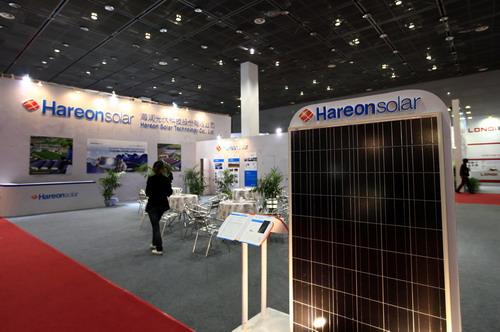
Visitors examine Chinese photovoltaic solar cell products at the 2011 China (Wuxi) International Renewable Energy Conference and Exhibition held in Wuxi, Jiangsu province, last week. [Photo/China Daily]
Officials warn that action could hurt industry in both countries
BEIJING / NEW YORK - China is very concerned about the anti-dumping, anti-subsidy investigation into Chinese photovoltaic (PV) solar cell producers initiated by the United States, the Ministry of Commerce said in a statement on Thursday.
The investigation will hurt bilateral cooperation in the clean-energy sector as well as the US solar industry, according to the statement.
"China hopes the US will keep its promise not to take new trade protection measures and avoid hurting the economic and trade relationship between the two countries," said Shen Danyang, ministry spokesman.
"China has the right to take relevant measures within the framework of the World Trade Organization," Shen said.
The US International Trade Commission (ITC) held the first hearing on Wednesday in Washington, dealing with a petition by American manufacturers, led by the US arm of SolarWorld AG, one of Germany's largest solar product makers.
The petition claims that Chinese companies are "dumping" solar panels in the US "at less than half of what the production costs would be". The petition asks for 100 percent tariffs to make up the difference.
However, because of objections by other large US solar companies, the ITC postponed its vote on the matter until Dec 2, according to Li Junfeng, secretary-general of the Chinese Renewable Energy Industries Association (CREIA).
He said many major US solar companies clearly realize that if the US government imposes higher tariffs on Chinese solar products, it will increase costs for US companies and reduce shipments of solar cell production equipment from the US to China.
"Many PV solar producers in both China and the US are facing difficulties because of reduced incentives, improper investment decisions and lack of scale, and it is normal some companies will be eliminated from the industry," said Li.
"The US government should not hurt the development of the global clean-energy industry in order to protect a few US companies' benefits."
"Should tariffs be imposed, our business would continue to compete, but it would unfortunately stall the industry and prevent our customers from hiring many more people to advance the solar industry," said Robert Petrina, managing director, Yingli Americas.
China-based Yingli Green Energy Holding Co Ltd, the world's third-largest solar panel maker, established US operations at the beginning of 2009.
Responding to the dumping claims, Yingli said it does not think that its products are unfairly subsidized.
"The anti-dumping case is likely to succeed in the end," said Kevin Tu, senior associate of China Energy & Climate Policy at the Carnegie Endowment for International Peace.
"Nevertheless, it will become a messy situation for the solar industry in the end, as the Chinese solar industry is likely to file a retaliation case against the US dumping poly-silicon exports in China," according to Tu.
According to CREIA, China spends $2 billion annually to import raw materials such as poly-silicon for PV solar cell production from the US.
The group also said that PV equipment imported from the US, combined with technology licensing, cost Chinese manufacturers at least $3 billion in 2010.





